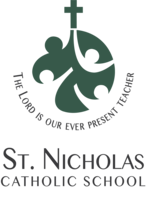We are proud to provide strong academic opportunities within a Catholic, faith-centered environment.
The mandated Alberta Program of Studies is taught for all core subject areas of Math, Science, Social and Language Arts. We will provide time to core subject learning while focusing on developing foundational knowledge, skills and attitudes.
Teachers will be engaging in collaborative planning throughout the school year to ensure the highest quality of educational programming. They will also be looking for ways to make cross-curricular connections between the different subject areas.
Faith is at the core of all that we do. In addition to dedicated Religion classes, faith is encouraged to permeate and be a part of every aspect of the school. We prepare our students to be caring, thoughtful and active citizens of the local and global community.
Our EICS Religious Education Consultant coordinates the Division's religious education and health and life skills programs.
Alberta Government – My Child’s Learning: A Parent Resource
Religious Education in Separate Schools
- http://www.learnalberta.ca/content/mychildslearning/kindergarten_religious.html
- http://www.learnalberta.ca/content/mychildslearning/grade1.html
- http://www.learnalberta.ca/content/mychildslearning/grade2.html
- http://www.learnalberta.ca/content/mychildslearning/grade3.html
- http://www.learnalberta.ca/content/mychildslearning/grade4.html
- http://www.learnalberta.ca/content/mychildslearning/grade5.html
- http://www.learnalberta.ca/content/mychildslearning/grade6.html
- http://www.learnalberta.ca/content/mychildslearning/grade7.html
- http://www.learnalberta.ca/content/mychildslearning/grade8.html
- http://www.learnalberta.ca/content/mychildslearning/grade9.html
"Mission... At the heart of catechesis we find, in essence, a person, the Person of Jesus of Nazareth, "the only son of the Father... full of grace and truth," who suffered and died for us and who now, after rising, is living with us for ever".
We must therefore say that, in catechesis, it is Christ, the Incarnate Word and Son of God, who was taught -- everything else is taught with reference to him -- and it is Christ alone, who teaches... (Apostolic Exhortation Catechesis Tradendae, p. 8-10)
What is our Religious Education Program about?
Each of us working in Catholic schools is called to be Christ's spokesperson, enabling Him to be present through us! The role of the Religious Education Consultant is to support all the stakeholders in our school division to fulfill this mission. In Catholic schools, we work together with the family and parish to help young people mature into disciples of Christ.
For someone who is new to the Catholic school system, an understandable question is what makes the schools Catholic? There is much that distinguishes Catholic schools, which students and their families can readily observe. The Religion Handbook below will provide you with answers.
Religion classes - which are outlined in this document.
Prayer services (liturgies of the word and mass) at key points in the school year
Liturgical Calendar
Religious symbols, posters, icons, and artwork etc.
School names, that tie into our faith, tradition and understanding.
Prayer at key times and events - over the intercom or in the classroom.
Grade 4 leadership retreat that supplements what is taught in religion classes.
Faith-related professional development days, which may be district-wide and school-based.
Chaplains and chapels - we have teaching, lay chaplains and we have a chapel
A District Religious Education Consultant.
A faith formation program for all staff to take courses, focused mostly on Catholic theology, scripture, and morality.
In addition to the above items are the following critically important dimensions of Catholic schools:
Teachers strive to integrate their faith with their teaching and interactions with everyone.
A faith conviction that each child and person's dignity comes from being created in the image of God, is promoted throughout Catholic schools.
The Biblical values of respect for the common good and justice for all are guiding principles that those working in our schools are encouraged to adopt.
Teachers work towards giving witness to their Christian faith by sharing their faith journeys and leading students in prayer and a life directed to the needs of those who are oppressed or destitute.
God, who we meet most fully in Christ, is proclaimed in word and deed according to the ability of each person working in our division to do so.
Schools actively work at connecting with the parishes by attending mass at the church or having parish priests visit the schools.
Many of the schools support the sacramental preparation done at home and through the parishes by having retreats on the themes related to reconciliation and confirmation.
All of our schools examine how they can improve the way they live out and give expression to their Catholic identity.
We see our homes, schools, and parishes as interconnected entities working together to teach, live and celebrate the good news of Jesus Christ.
The school system, then, needs the children enrolled in our schools and their families to support the Catholic values, beliefs and activities mentioned in this document.
Our publicly funded Catholic schools are an immense treasure: they support our children on their faith journeys and help their families and parishes lead them with and to Christ.
